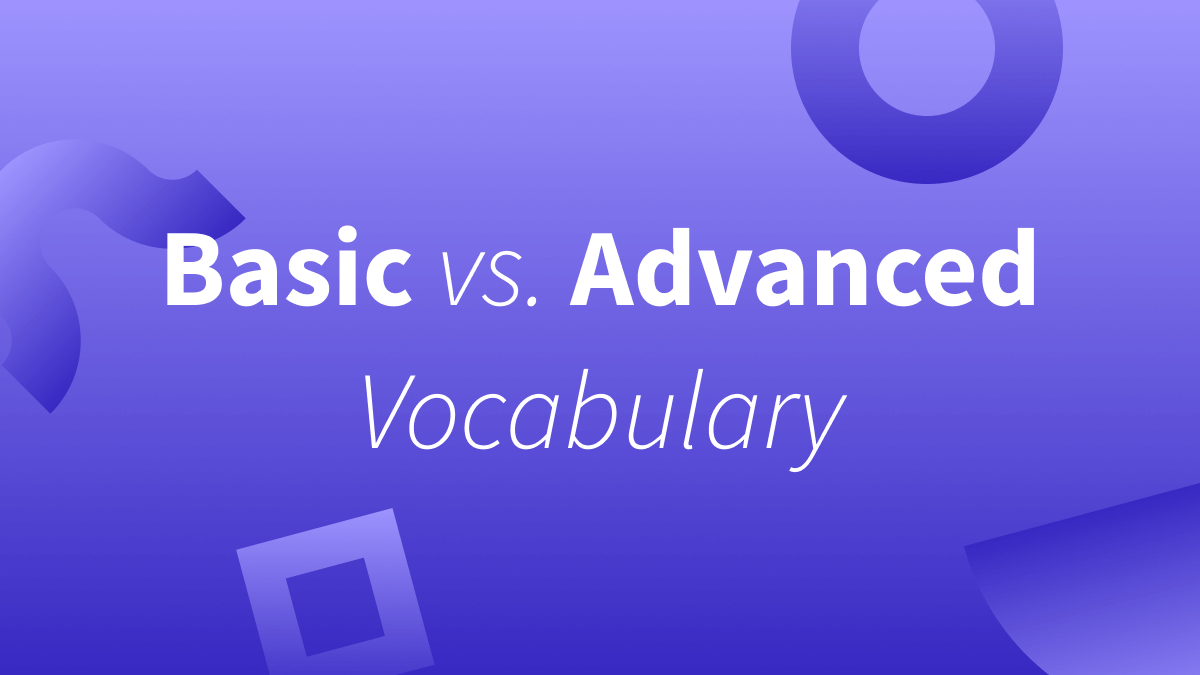Quick Summary on Using Basic or Advanced Vocabulary in Your Writing
- The difference between basic and advanced vocabulary is usually found in the complexity of the word. For example, use and utilize are synonyms, but use is considered basic, whereas utilize is the more advanced alternative.
- Using basic or advanced vocabulary depends on what you’re writing and who your audience is. For instance, you wouldn’t use advanced scientific terminology in a commercial intended for the general population.
- ○ They used all available funds.
- ○ They utilized all available funds.
Basic vs. Advanced Vocabulary
Different types of writing require different types of vocabulary. For instance, professional and academic texts (or any other that are written in formal language), are typically comprised of advanced vocabulary. Basic vocabulary is commonly reserved for settings in which the writer wants to be understood by as many people as possible, regardless of their proficiency in English. Consider the following examples:
Dogs are direct descendants of wolves.
Canis familiaris are direct descendants of canis lupus.
Which one is easier to understand?
Both sentences state the same thing using different words. The first sentence, which uses basic vocabulary, would be found in a more casual setting, perhaps in an advertisement for dog food. The second sentence, which uses advanced vocabulary, would probably be found in a scientific paper.
You may be wondering why you would want to include basic vocabulary in your writing. When you’re writing for a general audience, using easier language improves simplicity, making your writing more comprehensible for all types of readers.
LanguageTool’s paraphrasing tool ensures optimal word choice, regardless of what you're writing.
Examples of Basic vs. Advanced Vocabulary
Below, you can find more examples of basic and advanced vocabulary.
1. Need/Require
Basic: The company needs proper documentation in order to proceed.
Advanced: The company requires proper documentation in order to proceed.
2. Use/Utilize
Basic: The team will use all the resources they need.
Advanced: The team will utilize all the resources they need.
3. Job/Occupation
Basic: What is your current job?
Advanced: What is your current occupation?
4. Ask/Inquire
Basic: Thomas asked about the promotion.
Advanced: Thomas inquired about the promotion.
5. Show/Exhibit
Basic: Did the gallery show your artwork?
Advanced: Did the gallery exhibit your artwork?
6. Scary/Petrifying
Basic: The movie was scary.
Advanced: The movie was petrifying.
7. Tell/Inform
Basic: Did the representatives tell you about the upcoming project?
Advanced: Did the representatives inform you about the upcoming project?
8. Check/Verify
Basic: Please check that all the information is correct.
Advanced: Please verify that all the information is correct.
9. Buy/Purchase
Basic: Jonathan wanted to buy as many stocks as possible.
Advanced: Jonathan wanted to purchase as many stocks as possible.
10. Find/Discover
Basic: The department needed to find what was causing the rise in crime.
Advanced: The department needed to discover what was causing the rise in crime.
When To Use Basic vs. Advanced Vocabulary
Using basic or advanced vocabulary goes hand in hand with formal and informal writing. In other words, advanced vocabulary is usually found in formal writing and basic vocabulary is commonly found in informal writing. However, this isn’t a definitive rule. As a writer, it is ultimately up to you which words to use that will help you clearly get your message across in a way your readers understand.
The most important aspect of choosing basic or advanced vocabulary is correct spelling and usage. LanguageTool’s advanced editing and proofreading technology can ensure that your writing is error-free, regardless of what type of vocabulary you use.

